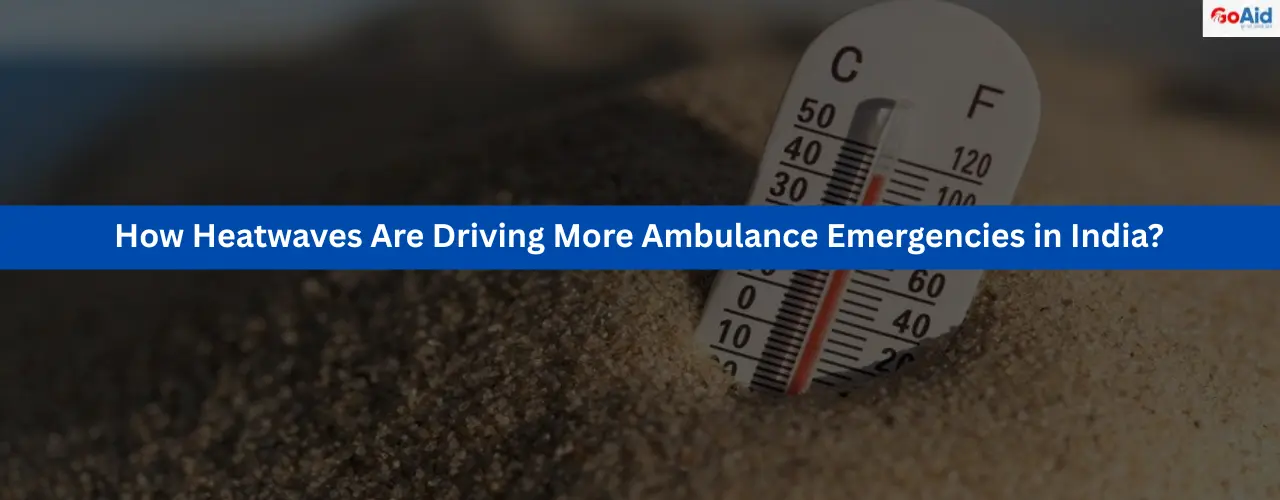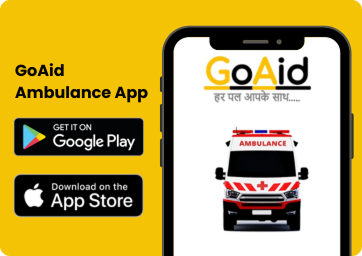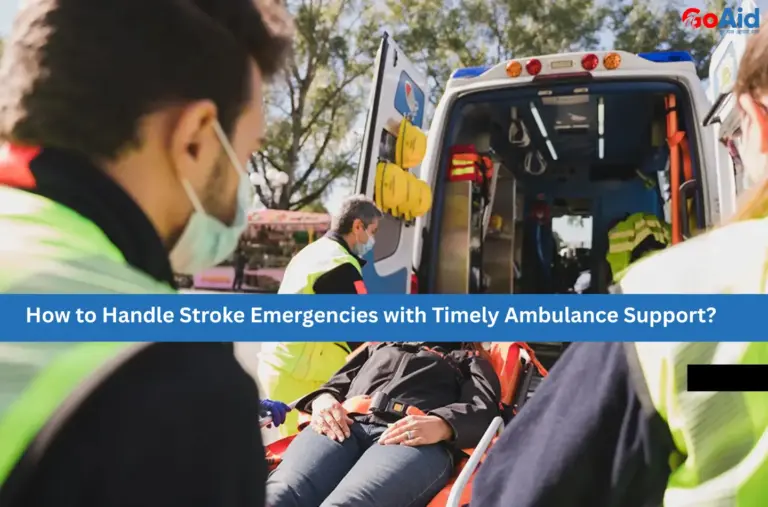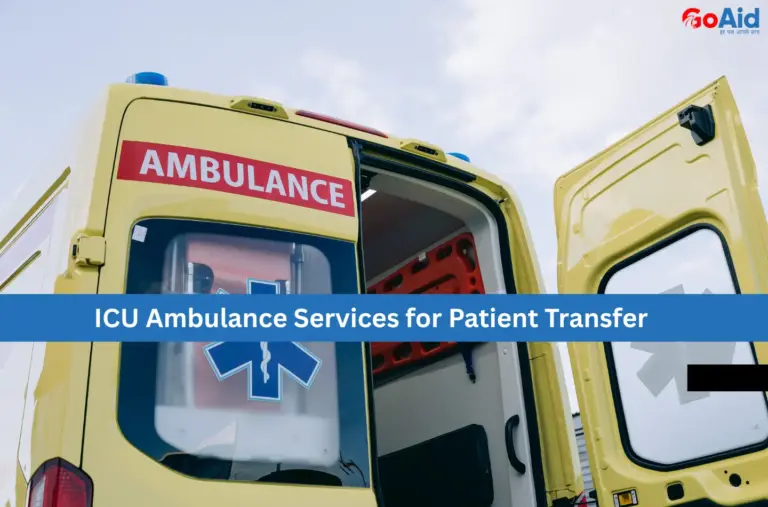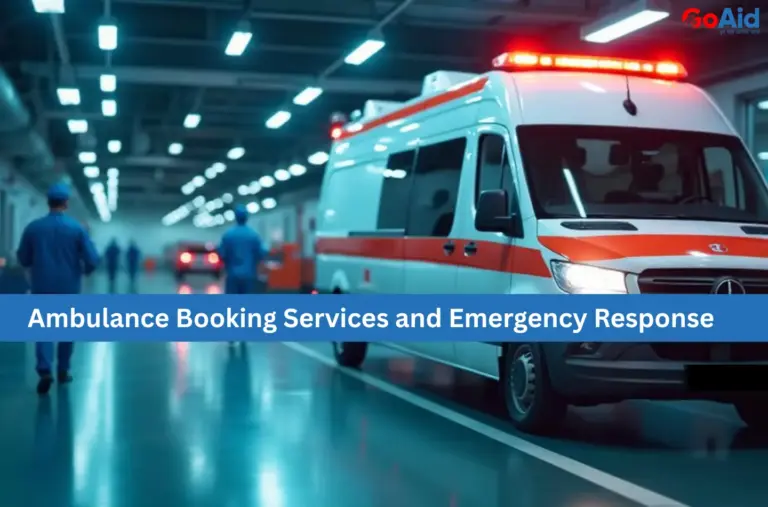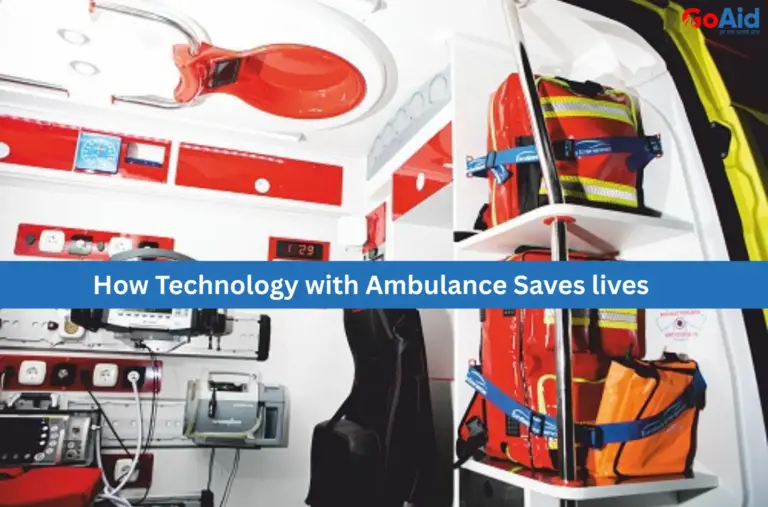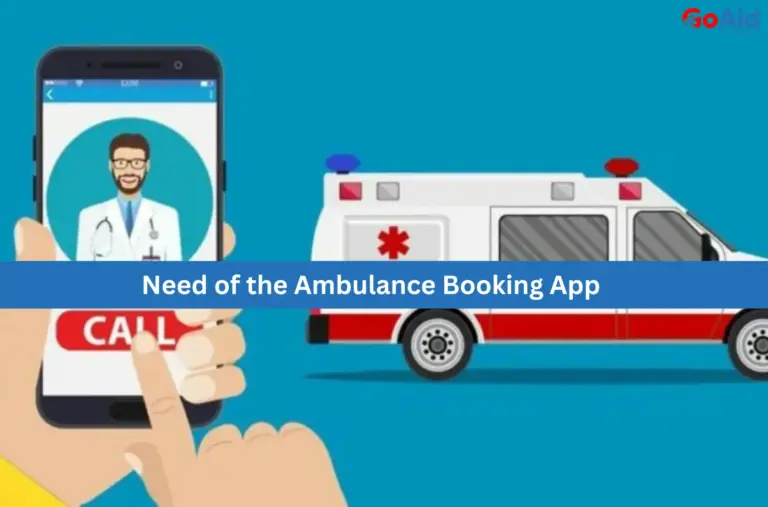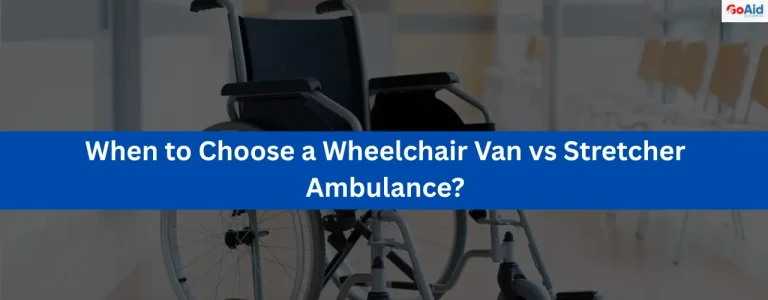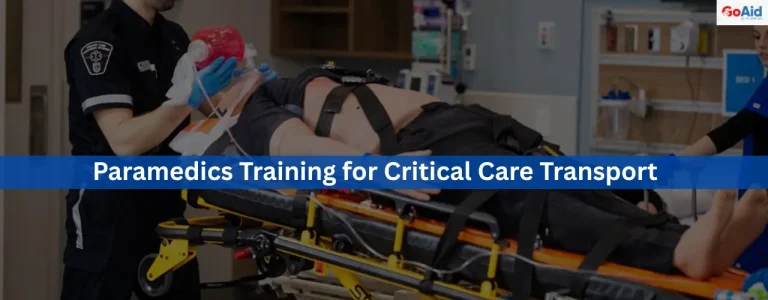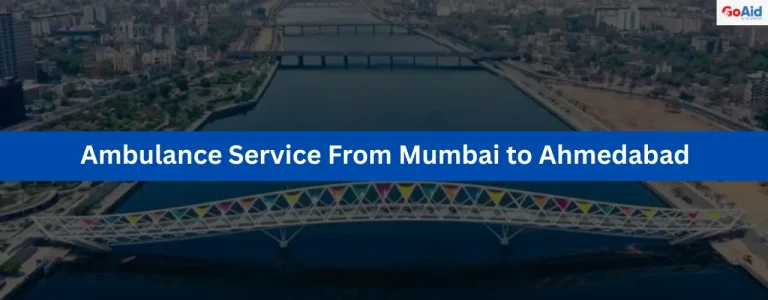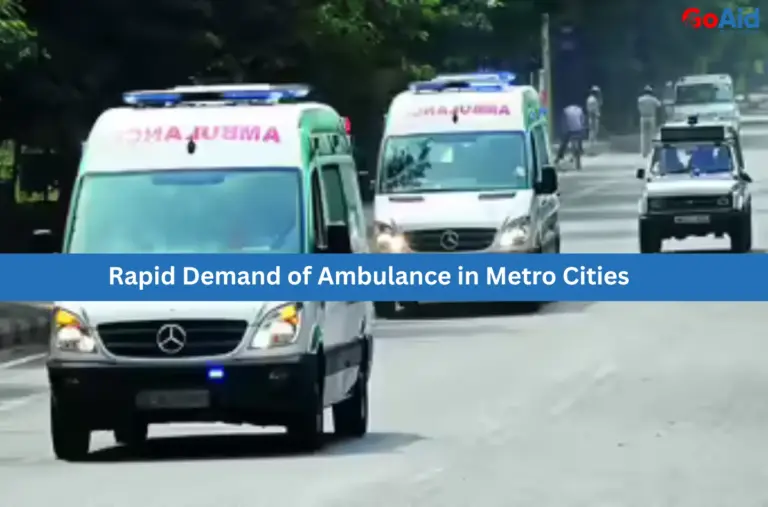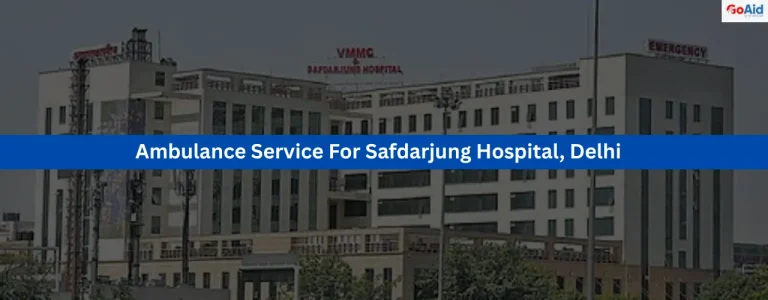As we know that this is the month of May in India, and March, April, May, June, and July are known as the summer months. During May, June, and July, we can observe some intense heat waves in India and many other parts of Asia. These heat waves create medical emergencies for many people who get caught in them.
This is why knowing about heatwave emergencies is crucial for everyone. In this blog, we have added all the details about heatwave emergencies, their repercussions, how they are driving more ambulance emergencies in India, their precautions and treatment, and lastly, which ambulance you should book for a heatwave-related medical emergency. If you’re excited to know all this, then read this blog to the end.
So, letŌĆÖs start-
What is Heatwave? ŌĆō Heat Wave Definition
A heatwave is a prolonged period of excessively hot weather, which can last for several days or weeks. This intense hot weather is defined by temperatures that are significantly higher than average, often reaching dangerous levels.
In India, heatwaves are common during the summer months, especially from May to July. These extreme conditions are often exacerbated by the urban heat island effect and changing climate patterns. A severe heatwave can lead to serious health risks, making it essential for individuals to understand its potential impact and be prepared to handle such emergencies.
Why Heatwaves are Dangerous?
Heatwaves are dangerous because they can cause severe health problems, particularly for vulnerable individuals like the elderly, children, and those with pre-existing health conditions. Extreme heat leads to dehydration, heat exhaustion, and in severe cases, heatstroke. Heatwave emergencies can overwhelm medical resources, resulting in delays in providing care.┬Ā
The scorching temperatures can also cause heatwave strokes, which require immediate intervention. Extended exposure to excessive heat can cause heat-related illnesses, and in extreme cases, it can even result in death. Understanding the dangers of heat waves helps ensure timely medical response and prevention.
Possible Repercussions of Heatwaves
The repercussions of a heatwave can extend far beyond just discomfort. Prolonged exposure to extreme heat waves can lead to various serious health issues. The consequences can be deadly if not managed properly. Below are the main repercussions of a heatwave emergency:
1. Heat Exhaustion:
Heat exhaustion occurs when the body becomes dehydrated and overheated, causing symptoms like dizziness, nausea, and fatigue. Immediate hydration and cooling are necessary.
2. Heatstroke:
Heatstroke is a life-threatening condition that occurs when the body’s temperature rises above 104┬░F. It causes confusion, rapid pulse, and unconsciousness, requiring emergency medical care.
3. Dehydration:
Excessive sweating and lack of hydration during a heatwave can lead to severe dehydration, causing dry mouth, dizziness, and fainting. Rehydration with fluids is crucial.
4. Heart Problems:
Excessive heat weather puts additional stress on the heart, potentially triggering heart attacks or exacerbating pre-existing heart conditions.
5. Respiratory Issues:
Hot weather can worsen air quality, leading to breathing difficulties, especially for those with respiratory diseases like asthma.
6. Heat-induced Cramping:
Muscle cramps are common in heat waves due to excessive sweating and dehydration. These painful cramps can cause temporary immobility and discomfort.
7. Impact on Mental Health:
Prolonged exposure to heat waves can contribute to mental stress, irritability, and fatigue, affecting overall well-being and leading to conditions like heat-induced anxiety.
Also Read: Evolution of GoAid: From 1 City to PAN India
How Heatwaves Are Driving More Ambulance Emergencies in India?
With heatwaves becoming more frequent and severe in India, the number of ambulance emergencies has significantly increased. The extreme conditions cause a spike in heat-related illnesses, leading to higher demand for emergency medical transport services, especially in major cities.
1. Rise in Heatstroke Cases:
Heatstroke is one of the most severe consequences of a heatwave. Its symptomsŌĆöconfusion, fainting, and elevated body temperatureŌĆörequire immediate emergency response. Hospitals and ambulances are often overwhelmed with cases during heat waves.
2. Increased Heart Attack Incidents:
High heat waves put extra stress on the heart, particularly for people with pre-existing heart conditions. This can lead to an increase in heart attacks, prompting emergency ambulance responses to transport patients to medical facilities for urgent care.
3. Higher Dehydration-related Emergencies:
Heatwaves cause excessive sweating, leading to dehydration. Symptoms like dizziness, weakness, and fainting require quick medical attention, driving an increase in ambulance calls for people needing fluids and treatment.
4. Dehydration and Kidney Failure:
Severe dehydration during hot weather can lead to kidney issues, causing kidney failure in extreme cases. These patients need immediate emergency transport to hospitals for hydration and further medical intervention.
5. Rise in Respiratory Problems:
The combination of heatwaves and pollution can worsen air quality, causing breathing difficulties and worsening respiratory conditions. Ambulance services are often called to transport individuals suffering from heat-induced asthma or other breathing problems.
6. Increased Incidents of Heat Exhaustion:
Heat exhaustion occurs when the body loses too much water and salt through sweating. Symptoms like nausea, dizziness, and muscle cramps increase the need for ambulance services to provide medical care and cooling during heat waves.
7. Medical Emergencies Among Vulnerable Populations:
Elderly individuals, children, and people with chronic illnesses are at higher risk during a heatwave. Their weakened health conditions often lead to severe medical emergencies, requiring quick access to emergency ambulances.
8. Mental Health Crisis During Heatwaves:
Excessive heat can cause increased stress and irritability, leading to mental health emergencies. The rise in cases of anxiety and confusion increases the demand for emergency medical transportation.
9. Delayed Medical Assistance Due to Overburdened Systems:
The surge in heatwave emergency calls often overwhelms local health systems. Ambulances and hospitals are flooded with patients, leading to delays in treatment, especially in cities facing severe heatwaves.
10. Increase in Fatalities:
In extreme heatwaves, fatalities due to heatstroke, heart attacks, and organ failure rise. The demand for ambulance services spikes as emergency response teams rush to provide urgent care to prevent fatalities and save lives.
Precautions for Heatwaves
During heat waves, taking the right precautions can prevent serious health issues. These measures can help individuals stay safe and avoid heat-related illnesses.
1. Stay Hydrated:
Drink plenty of fluids, particularly water, to stay hydrated and avoid dehydration, which can lead to heat exhaustion and heatstroke.
2. Wear Lightweight Clothing:
Wear loose, light-colored clothing that allows sweat to evaporate. Avoid dark colors, as they can absorb heat and increase body temperature.
3. Limit Outdoor Activities:
Avoid outdoor activities, especially during peak heat hours (10 AM to 4 PM), as extreme temperatures can strain your body.
4. Use Sunscreen:
Apply sunscreen regularly to protect your skin from harmful UV rays. This will prevent sunburn and reduce the risk of heat-induced skin damage.
5. Stay in Cool Spaces:
Stay indoors in air-conditioned or shaded areas to avoid prolonged exposure to the sun. If possible, avoid crowded places during a heatwave.
6. Wear a Hat and Sunglasses:
Protect your head and eyes from direct sunlight by wearing a wide-brimmed hat and UV-blocking sunglasses.
Read More: The Ultimate Guide to High-Fiber Foods for a Healthier You
Treatment/Remedies of Heatwaves
If someone shows signs of heat exhaustion or heatstroke, immediate treatment is critical. Here are remedies to manage heatwave emergencies:
1. Move to a Cooler Area:
Relocate the person to an air-conditioned room or a cool, shaded area to lower body temperature and prevent further complications.
2. Rehydrate with Water and Electrolytes:
Provide the individual with water and electrolyte-rich drinks like sports drinks. Avoid caffeinated or alcoholic beverages that can worsen dehydration.
3. Cool the Body with Water:
Soak a cloth in cold water and apply it to the person’s body, or use a cool shower or bath to lower body temperature.
4. Rest in a Reclining Position:
Encourage the affected person to lie down in a cool, shaded area. Elevating their legs may help improve blood circulation.
5. Apply Ice Packs:
Place ice packs or cold compresses on areas like the neck, armpits, and groin to rapidly cool the body.
Best Ambulance for Severe Cases of Heatwaves
In the case of a severe heatwave emergency, the best option is GoAid Ambulance Service. GoAid offers fast, reliable, and well-equipped ambulances to handle heatstroke, dehydration, and other heat-related illnesses. With a fleet of state-of-the-art ambulances, including ICU-equipped vehicles for severe cases, GoAid ensures rapid medical transport.┬Ā
Their expert paramedic teams are trained to handle heatwave strokes, providing immediate care en route. Whether itŌĆÖs for an emergency ambulance service in India or an interstate ambulance request, GoAidŌĆÖs 10-minute response time guarantees swift medical assistance, saving lives during extreme conditions.
Conclusion to Heatwave Emergency
In conclusion, weŌĆÖve covered the critical aspects of heatwave emergenciesŌĆöfrom understanding what a heatwave is, why itŌĆÖs dangerous, to the necessary precautions and treatments. ItŌĆÖs essential to stay informed about the potential risks and be prepared for heat-related emergencies, especially during intense hot weather months in India.
If you or someone you know is affected by the severe heat, make sure to seek immediate medical assistance. GoAid Ambulance Services offers the fastest, most reliable emergency care to manage heatwave strokes and other severe heat-related conditions. If you have any other questions or need further guidance, feel free to ask in the comments below.
FAQs related to the Heatwave Emergency
Question-1: What is a heatwave, and how does it affect the body?
Answer: A heatwave is a prolonged period of excessively hot weather, often causing heatwave strokes and dehydration. Heatwaves in India can lead to heatwave emergencies, requiring emergency ambulance services for immediate medical intervention.
Question-2: What are the main symptoms of a heatwave stroke?
Answer: Symptoms of a heatwave stroke include high body temperature, confusion, dizziness, rapid pulse, and skin redness. Heatstroke can be life-threatening, requiring urgent medical attention and an emergency ambulance for fast transportation to a hospital.
Question-3: How can emergency ambulances help during a heatwave emergency?
Answer: During a heatwave emergency, emergency ambulances are equipped with medical staff and cooling devices to provide life-saving care. They can transport individuals experiencing heatstroke or dehydration, ensuring timely treatment for heat-related illnesses.
Question-4: What is the heatwave definition?
Answer: A heatwave is defined as a period of excessively hot weather, often in the range of 40-45┬░C, which persists for several days. This excessive heat weather can have severe health impacts, leading to heatwave emergencies.
Question-5: How do heatwaves impact health in hot weather conditions?
Answer: Heatwaves exacerbate the effects of hot weather, causing heat exhaustion, dehydration, and heatstrokes. These health issues often lead to increased calls for emergency ambulance services to transport affected individuals to medical facilities.
Question-6: When should you seek medical help during a heatwave?
Answer: If someone shows signs of heatstroke, such as confusion, fainting, or dizziness during a heatwave, immediate medical attention is crucial. Calling an emergency ambulance ensures fast, professional care and safe transportation to a hospital.
Question-7: How does heatwave stroke differ from regular dehydration?
Answer: Heatwave stroke occurs when the bodyŌĆÖs temperature regulation fails during extreme heat, whereas dehydration is the result of excessive fluid loss. Both conditions are critical and require emergency ambulance services for rapid treatment.
Question-8: Why do heatwaves in India cause so many ambulance emergencies?
Answer: Heatwaves in India lead to sudden increases in heatwave strokes, dehydration, and heat exhaustion, which overwhelm local hospitals. The surge in medical emergencies often causes a higher demand for emergency ambulance services across affected regions.
Question-9: How can I prepare for a severe heatwave alert?
Answer: To prepare for a severe heatwave alert, stay indoors during peak heat hours, hydrate often, and avoid strenuous activity. If symptoms of heatstroke occur, seek immediate help by calling an emergency ambulance for transport to medical care.
Question-10: What should I do if I experience signs of heatstroke during a heatwave?
Answer: If you experience signs of heatstroke, move to a cooler area, hydrate, and cool your body with ice packs. For severe cases, immediately call an emergency ambulance to ensure rapid medical intervention before symptoms worsen.

